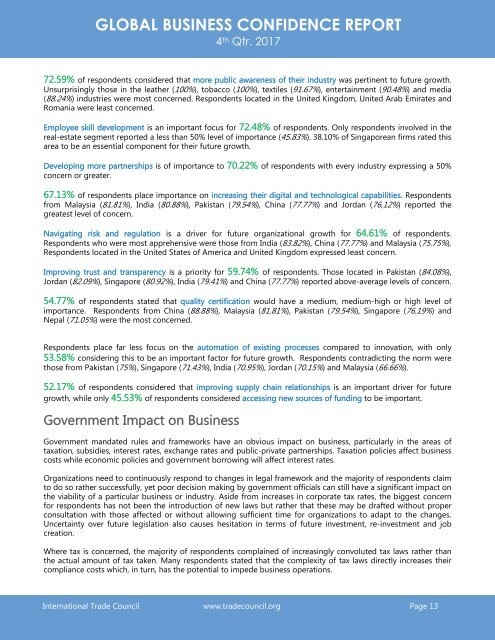2017 4th Quarter International Trade Council Global Business Confidence Survey
The Global Business Confidence Survey is designed to take the pulse of companies and sectors and reports on the conditions for businesses like yours. It offers valuable insights into trends of US and global business confidence by surveying people from across a broad spectrum of industries. The survey draws information from a range of sectors about current and historical business growth trends, efficiency, employment, regulation and other conditions affecting industry. Key users of statistical data include government agencies, trade bodies, chambers of commerce and academic researchers. This survey report was produced by the International Trade Council (http://www.tradecouncil.org | http://www.itcapproved.org).
The Global Business Confidence Survey is designed to take the pulse of companies and sectors and reports on the conditions for businesses like yours. It offers valuable insights into trends of US and global business confidence by surveying people from across a broad spectrum of industries. The survey draws information from a range of sectors about current and historical business growth trends, efficiency, employment, regulation and other conditions affecting industry.
Key users of statistical data include government agencies, trade bodies, chambers of commerce and academic researchers. This survey report was produced by the International Trade Council (http://www.tradecouncil.org | http://www.itcapproved.org).
You also want an ePaper? Increase the reach of your titles
YUMPU automatically turns print PDFs into web optimized ePapers that Google loves.
GLOBAL BUSINESS CONFIDENCE REPORT<br />
4 th Qtr. <strong>2017</strong><br />
72.59% of respondents considered that more public awareness of their industry was pertinent to future growth.<br />
Unsurprisingly those in the leather (100%), tobacco (100%), textiles (91.67%), entertainment (90.48%) and media<br />
(88.24%) industries were most concerned. Respondents located in the United Kingdom, United Arab Emirates and<br />
Romania were least concerned.<br />
Employee skill development is an important focus for 72.48% of respondents. Only respondents involved in the<br />
real-estate segment reported a less than 50% level of importance (45.83%). 38.10% of Singaporean firms rated this<br />
area to be an essential component for their future growth.<br />
Developing more partnerships is of importance to 70.22% of respondents with every industry expressing a 50%<br />
concern or greater.<br />
67.13% of respondents place importance on increasing their digital and technological capabilities. Respondents<br />
from Malaysia (81.81%), India (80.88%), Pakistan (79.54%), China (77.77%) and Jordan (76,12%) reported the<br />
greatest level of concern.<br />
Navigating risk and regulation is a driver for future organizational growth for 64.61% of respondents.<br />
Respondents who were most apprehensive were those from India (83.82%), China (77.77%) and Malaysia (75.75%).<br />
Respondents located in the United States of America and United Kingdom expressed least concern.<br />
Improving trust and transparency is a priority for 59.74% of respondents. Those located in Pakistan (84.08%),<br />
Jordan (82.09%), Singapore (80.92%), India (79.41%) and China (77.77%) reported above-average levels of concern.<br />
54.77% of respondents stated that quality certification would have a medium, medium-high or high level of<br />
importance. Respondents from China (88.88%), Malaysia (81.81%), Pakistan (79.54%), Singapore (76.19%) and<br />
Nepal (71.05%) were the most concerned.<br />
Respondents place far less focus on the automation of existing processes compared to innovation, with only<br />
53.58% considering this to be an important factor for future growth. Respondents contradicting the norm were<br />
those from Pakistan (75%), Singapore (71.43%), India (70.95%), Jordan (70.15%) and Malaysia (66.66%).<br />
52.17% of respondents considered that improving supply chain relationships is an important driver for future<br />
growth, while only 45.53% of respondents considered accessing new sources of funding to be important.<br />
Government Impact on <strong>Business</strong><br />
Government mandated rules and frameworks have an obvious impact on business, particularly in the areas of<br />
taxation, subsidies, interest rates, exchange rates and public-private partnerships. Taxation policies affect business<br />
costs while economic policies and government borrowing will affect interest rates.<br />
Organizations need to continuously respond to changes in legal framework and the majority of respondents claim<br />
to do so rather successfully, yet poor decision making by government officials can still have a significant impact on<br />
the viability of a particular business or industry. Aside from increases in corporate tax rates, the biggest concern<br />
for respondents has not been the introduction of new laws but rather that these may be drafted without proper<br />
consultation with those affected or without allowing sufficient time for organizations to adapt to the changes.<br />
Uncertainty over future legislation also causes hesitation in terms of future investment, re-investment and job<br />
creation.<br />
Where tax is concerned, the majority of respondents complained of increasingly convoluted tax laws rather than<br />
the actual amount of tax taken. Many respondents stated that the complexity of tax laws directly increases their<br />
compliance costs which, in turn, has the potential to impede business operations.<br />
<strong>International</strong> <strong>Trade</strong> <strong>Council</strong> www.tradecouncil.org Page 13


